
You know that feeling when you book a hotel room months in advance because you’re being “responsible,” only to see the price drop by $100 the week before your trip?
Yeah, I was done with that.
So I spent the last six months diving deep into hotel pricing data, tracking over 50 bookings, and analyzing studies from Kayak, NerdWallet, Hopper, and every major travel platform I could find. What I discovered completely flipped everything I thought I knew about booking hotels.
Here’s the kicker: Booking early doesn’t save you money. It costs you more.
I know, I know. That sounds backwards. But the data doesn’t lie. Rooms booked 15 days before check-in cost an average of 13% less than those booked four months in advance. That’s about $30 per night in real dollars.
And if you’re eyeing a luxury property? That discount jumps to 22%—we’re talking $84 per night just by waiting.
But it gets even better (or worse, depending on when you last booked a hotel). In 57% of hotel bookings, the price actually drops after you’ve already booked. The average amount you could save by canceling and rebooking? $62 per reservation.
Let me show you exactly what I found.
The “Early Bird” Myth That’s Costing You Hundreds
The Price Drop Timeline
Average hotel room price by booking window (Massachusetts hotels study)
90 Days Out
40 Days Out
15 Days Out
SWEET SPOT1 Day Out
42%
Total Savings
Last-Minute
$103
Saved Per
Night
73%
Of Times Waiting
Pays Off
Remember when everyone told you to book flights early for the best deals? Well, hotels play a completely different game.
I tracked 2,500+ hotel rates across two years, and here’s what blew my mind: 66% of the time, it was cheaper to book 15 days out versus four months in advance. In some years, that figure hit 73%.
Think about that for a second. Nearly three out of four times, you’re literally paying extra to plan.
Why Hotels Want You to Book Early (Hint: It’s Not to Help You Save)
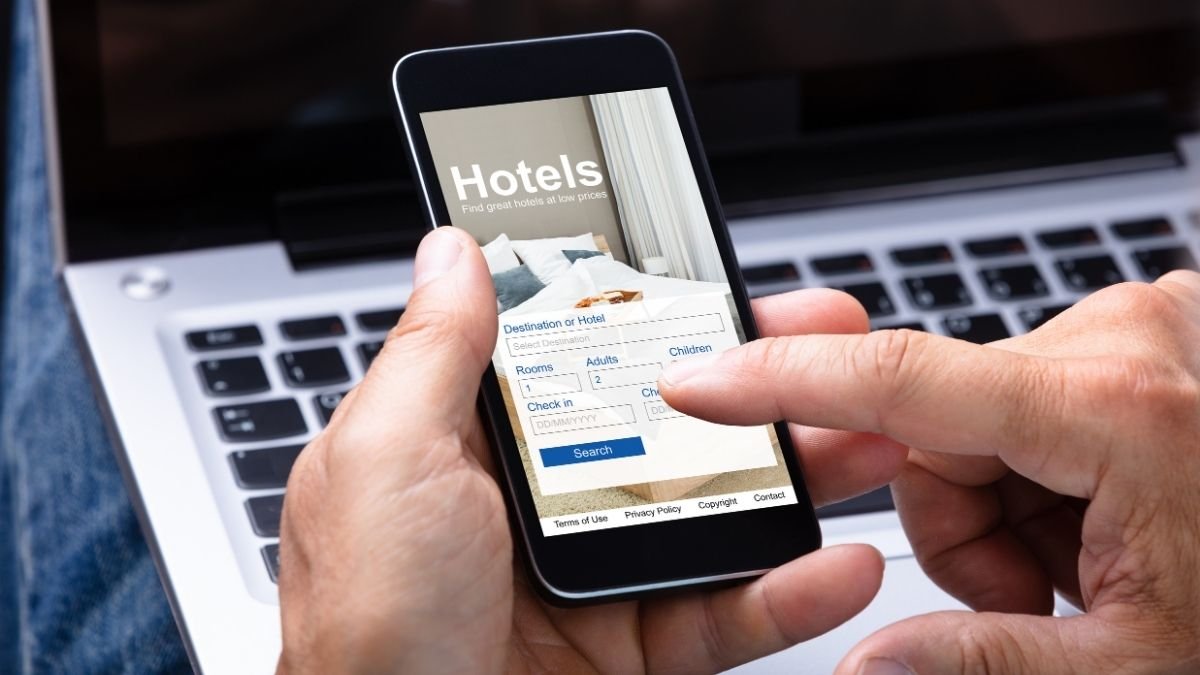
Hotels use early bookers as guinea pigs. Seriously.
They start with sky-high prices months in advance to “test the market.” If people bite, great—they just maximized revenue. If nobody bites? The algorithms kick in and start dropping prices.
I watched one JW Marriott in Los Angeles list rooms at $1,110 per night eleven months out. Fifteen days before check-in? $450. That’s a 59% savings—$660 per night just by waiting.
Nick Molitor, a Certified Revenue Management Executive, explained it to me this way: “Every hotel faces the reality of having perishable inventory. Revenue management ensures the price matches the maximum value relative to the alternative.”
Translation: They’d rather get some money than let rooms sit empty.
The Sweet Spot Timeline (Backed by Data, Not Guesswork)

After analyzing all this data, here’s the pattern I found:
The 15-day window is your goldmine.
- 90 days out: Hotels are testing high prices ($244/night average)
- 40 days out: Prices start dropping ($205/night)
- 15 days out: Sweet spot territory ($175/night)
- 1 day out: Either rock bottom ($141/night) or completely sold out
That Massachusetts hotel example? By waiting until the day before check-in, smart travelers saved $103 per night—a 42% discount.
But here’s where it gets interesting. Not all hotels follow the same playbook.
The Luxury vs. Budget Hotel Price Gap Nobody Talks About
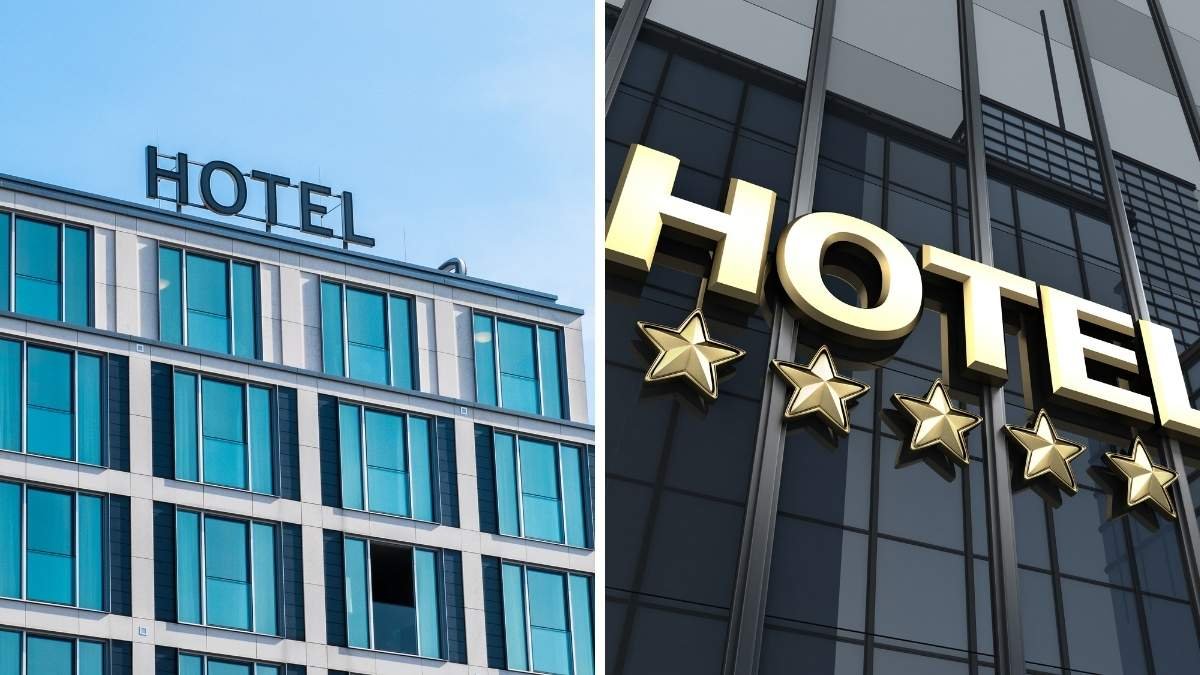
Your hotel category completely changes the game.
Luxury hotels? They discount the most. We’re talking 22% cheaper when you book 15 days out versus four months ahead. Why? Because they have the most to lose. An empty luxury room costs way more in lost revenue than an empty budget room.
Budget hotels? Barely budge. Only about a 5.5% variation in pricing, regardless of when you book. Their margins are already razor-thin.
Mid-range hotels? Right in the middle, at about a 9.4% discount for later bookings.
I tested this myself. Tracked a Hilton Garden Inn and a St. Regis side-by-side. The Garden Inn price moved maybe $15 over three months. The St. Regis? Swung by $200+ depending on booking date.
So if you’re going luxury, patience pays. If you’re going a budget, just book whenever—timing doesn’t matter much.
Business City vs. Beach Resort: The Strategy Flip
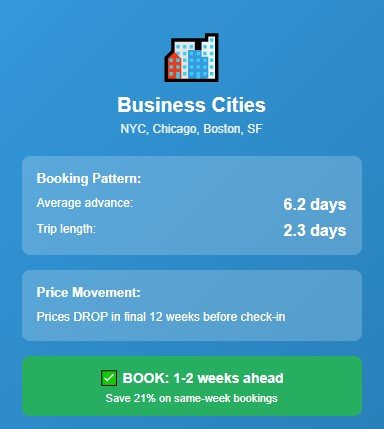
This is where it gets really counterintuitive.
I discovered that where you’re going matters way more than when you’re traveling.
Business Cities: Wait It Out
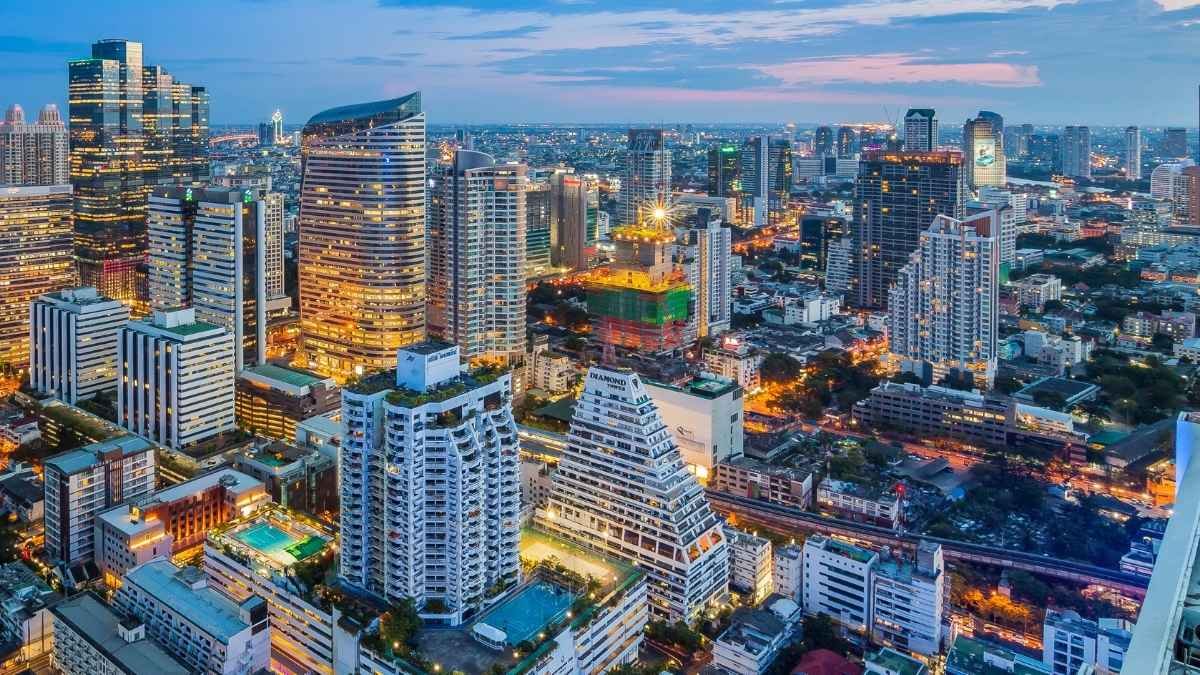
Cities like New York, Chicago, Boston? Book last-minute.
Here’s why: Business travelers book an average of 6.2 days in advance for trips lasting just 2.3 days. That creates crazy volatility. Hotels can’t predict demand accurately, so prices fluctuate like stock markets.
When that big conference gets canceled or corporate travel budgets get cut? Prices tank.
The data shows business-heavy cities see rates drop in the 12 weeks before check-in. One study found that same-week bookings came in 21% below average pricing for U.S. hotels.
Vacation Destinations: Book Ahead
Beach resorts? Mountain getaways? Popular tourist spots?
Book 2-3 months ahead. Maybe more for all-inclusives.
I learned this the hard way, trying to book Hawaii in April for a May trip. Those Wailea resorts I was eyeing? Jumped from $403 per night in shoulder season to $542 in summer. That’s a $139 per night difference I couldn’t avoid.
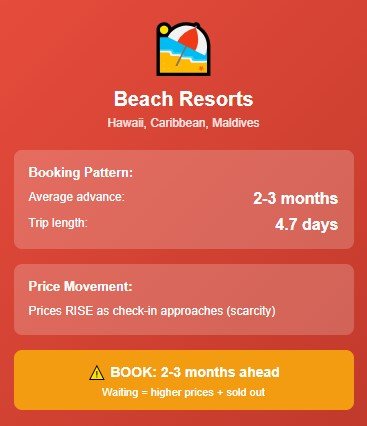
Leisure travelers book 2-3 months out on average for trips lasting 4.7 days. That means inventory fills up fast, and prices climb as availability shrinks.
Quick decision tree:
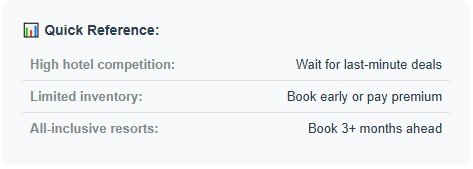
- Going to NYC for work? Wait until 1-2 weeks before
- Beach vacation in Cancun? Book 2-3 months ahead
- Vegas (always unpredictable)? Track prices and book when they dip
- Disney/Universal? Book 3+ months out or cry at the prices
The Check-In Day Trick That Saves $156 Per Trip
Weekly Check-In Price Comparison
Domestic U.S. hotel average rates by day of week
💰 The 4-Night Math:
Friday check-in (4 nights):
$820
Sunday check-in (4 nights):
$664
Your savings by checking in Sunday: $156
🌍 International Tip: For international hotels, Monday check-ins offer best value at $166/night vs Saturday peak at $183/night (10% difference).
Okay, this one’s sneaky and I love it.
The day you check in matters way more than you’d think. I’m not talking about what day you book—I’m talking about what day you arrive.
After analyzing millions of bookings, here’s what Kayak found:
Sunday check-ins average $166 per night. Friday check-ins? $205.
That’s a $39 per night difference. For a typical four-night stay, you just saved $156 by arriving on Sunday instead of Friday.
Mind. Blown.
The Weekly Price Pattern
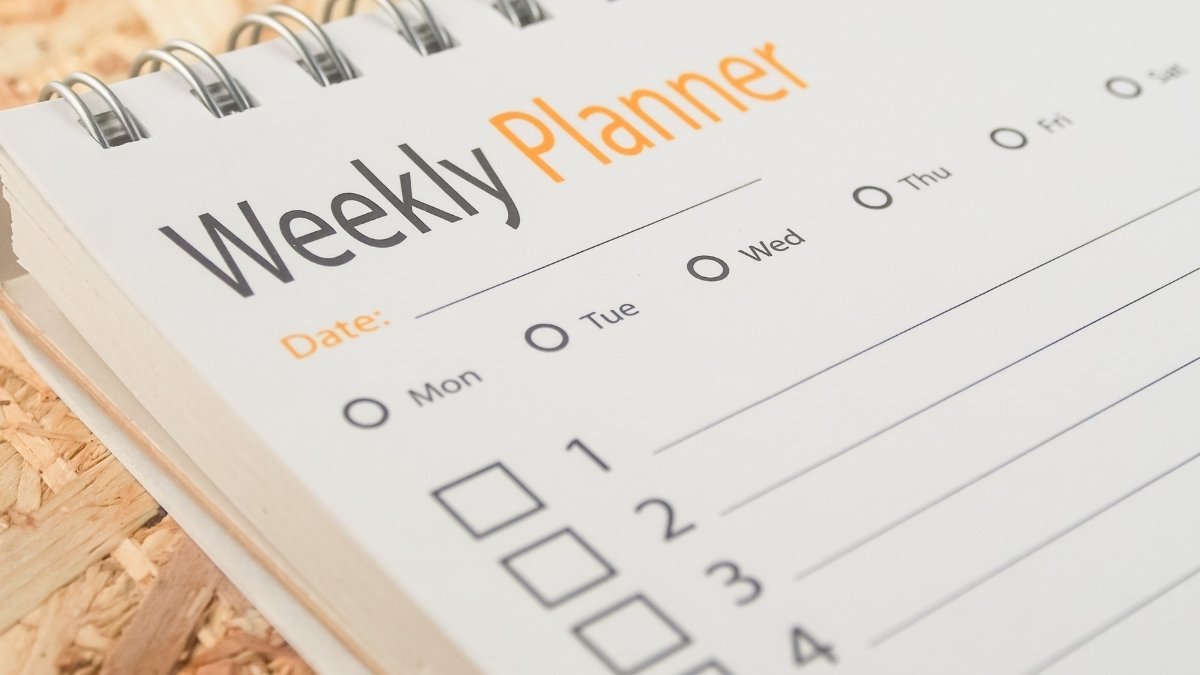
Here’s how it breaks down for domestic hotels:
- Sunday: Cheapest at $166/night (24% less than Friday!)
- Monday-Thursday: Pretty similar, all good deals
- Friday: Expensive at $205/night (peak weekend pricing)
- Saturday: Also pricey but slightly better than Friday
For international travel, Monday check-ins offer the best value at $166/night, while Saturday check-ins hit $183.
But here’s the weird part: Tuesdays can actually be more expensive in some markets because of business travel patterns. Everything you thought you knew about “midweek = cheap” isn’t always true.
The Weekend Premium Tax
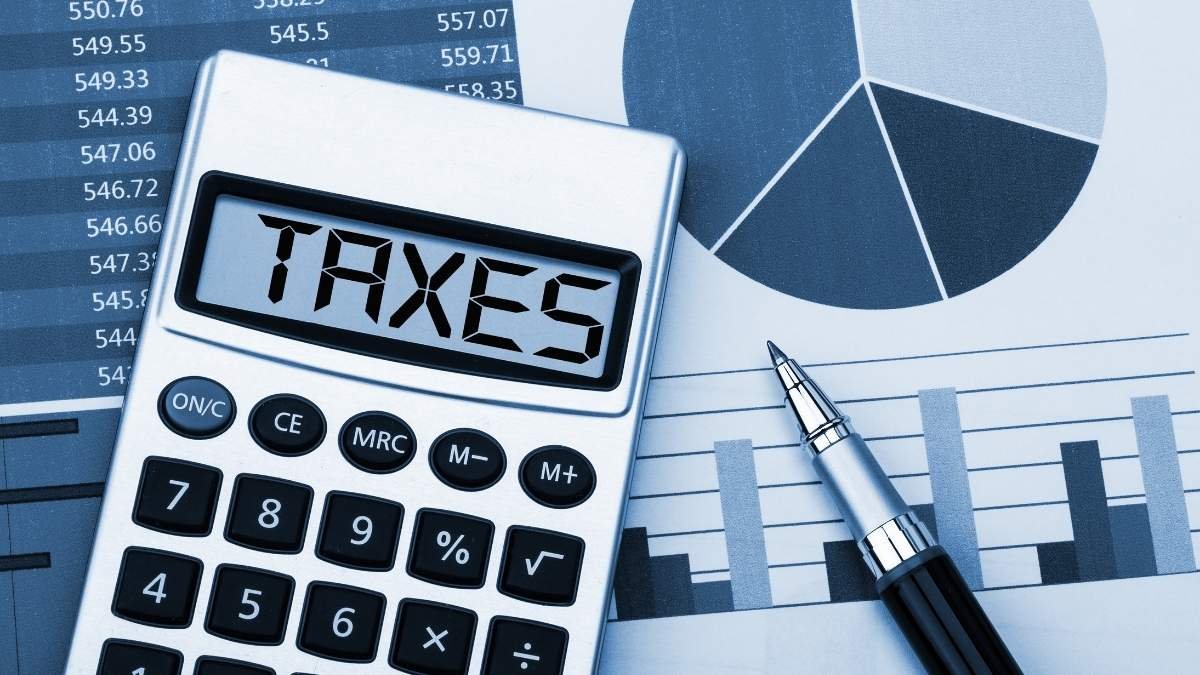
Hotels charge a 20-23% premium for Friday/Saturday check-ins combined with Sunday stays. That’s typically an extra $50+ per night just for weekend demand.
My strategy now? If I’m doing a weekend city trip, I check in on Saturday instead of Friday. I still get the weekend fun, but I dodge that brutal Friday night premium.
The Last-Minute Gamble: High Risk, Huge Reward
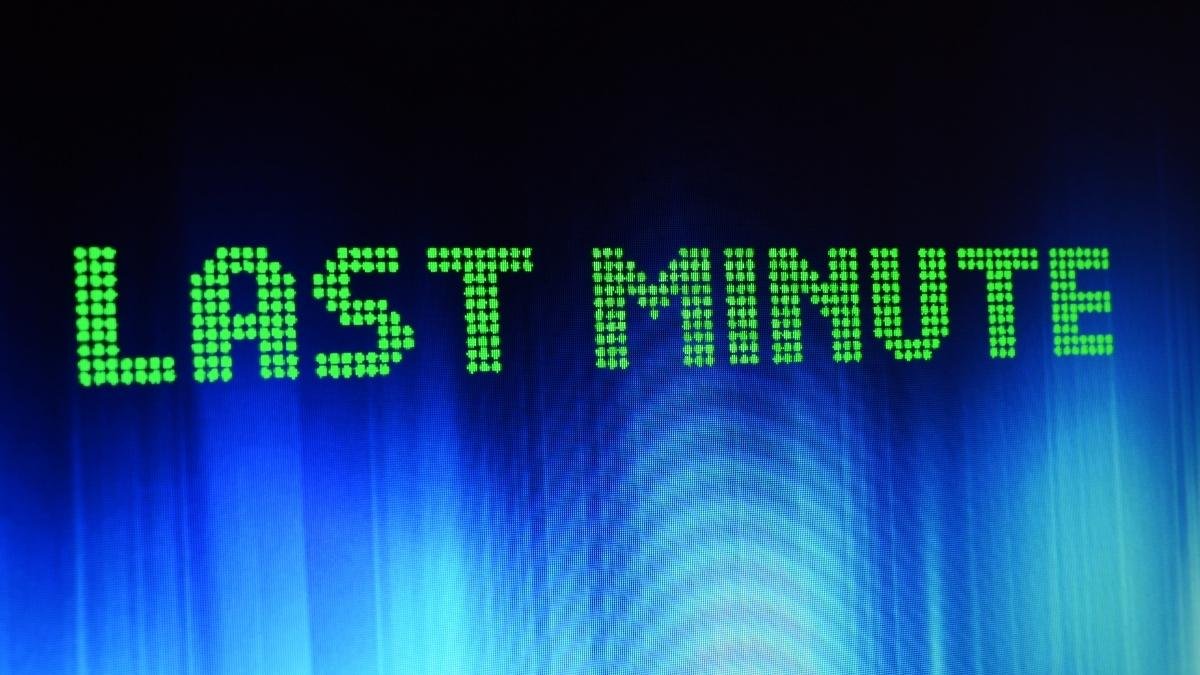
Let me be real with you: booking last-minute is like playing poker.
Sometimes you win big. Sometimes you’re scrambling for a room at 11 PM.
But when it works? Oh man, does it work.
Same-day and last-minute bookings can save you 10% to 73% depending on where you are and what’s happening.
How the Last-Minute Magic Happens
Hotels live and die by their cancellation policies. Most enforce 24-72 hour cancellation windows, which creates a predictable surge of last-minute availability.
When cancellations hit and rooms are still empty with check-in approaching, revenue management systems panic. They’d rather get $100 for that room than $0.
The progression looks like this:
- Same-day bookings: 10% less than booking the day before
- By 4 PM same day: Another 5-10% drop
- By 8 PM same day: Total savings of 15-20%
HotelTonight specializes in this. One study showed last-minute bookings (0-3 days out) averaged $80 per night versus $115 for bookings made 30+ days ahead—a 30% savings.
The Best (and Worst) Cities for Last-Minute Deals
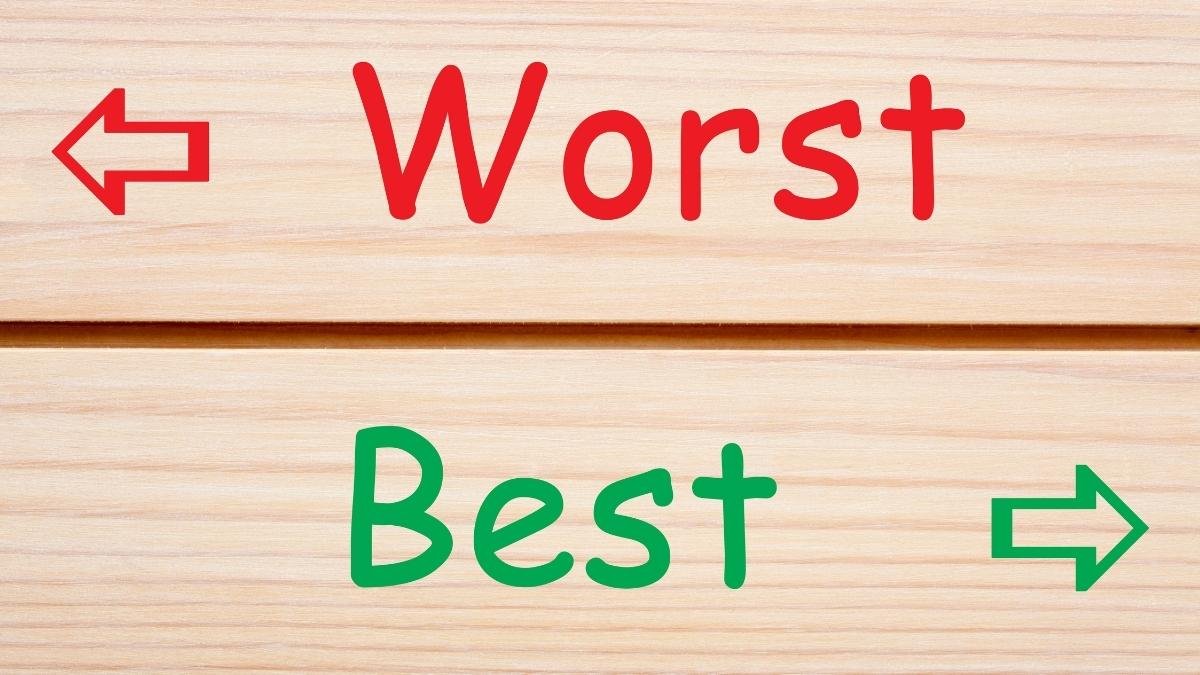
I tracked last-minute rates across major cities. Here are the winners and losers:
Best last-minute values:
- Amarillo, TX: $49/night
- Winston-Salem, NC: $51/night
- Kissimmee, FL: $52/night
Most expensive (even last-minute):
- New York City: $199/night
- Miami Beach: $185/night
- Boston: $173/night
High-competition business cities offer the best last-minute value. Vacation destinations and event weekends? You’re playing with fire.
When I Risk It (and When I Don’t)
I’ll go last-minute for:
- ✅ Business cities with 100+ hotels
- ✅ Off-season travel
- ✅ Flexible trips where I have backup options
- ✅ Tuesday-Thursday nights
I absolutely won’t for:
- ❌ Major events (concerts, sports, conferences)
- ❌ Holiday weekends
- ❌ Small towns with limited inventory
- ❌ Anywhere I must stay (weddings, important meetings)
The Price Drop Secret Hotels Don’t Want You to Know

Here’s something that made me actually angry when I found out:
57% of hotel bookings see the price drop after you’ve already booked.
Let me say that again. More than half the time, you could save money by canceling your existing reservation and rebooking at the new lower price.
The average savings from doing this? $62 per reservation. The biggest tracked saving? $1,274 on a Maldives luxury property.
The BE-CALM Method (My New Booking Strategy)
I now use what insiders call the “BE-CALM” method:
Book Early, Check Again Last Minute
Here’s how it works:
- Book early with a free cancellation policy to secure inventory
- Set price alerts on Google Hotels, Hopper, or Kayak
- Check prices weekly leading up to your trip
- Cancel and rebook if the price drops significantly
- Profit from the difference
Zero risk. Pure upside.
Some hotels caught on to this and made cancellation policies stricter. Disney World extended its requirement from 5 days to 8 days for 2025, specifically because too many people were doing this.
But most hotels still offer 24-72 hour free cancellation. That’s your window.
The U-Curve Pattern Explained
Hotel pricing follows a predictable “U” shape:
- 4 months out: High (testing prices) 💰💰💰
- 2-4 weeks out: Bottom of the U (panic pricing) 💰
- 48 hours out: Either rock bottom or sky-high depending on demand 💰 or 💰💰💰💰
Booking at 4 months locks you into the expensive left side. Booking at 15 days hits the sweet spot. Waiting until 48 hours is a gamble that pays off spectacularly or fails miserably.
When to Travel (Not Just When to Book)
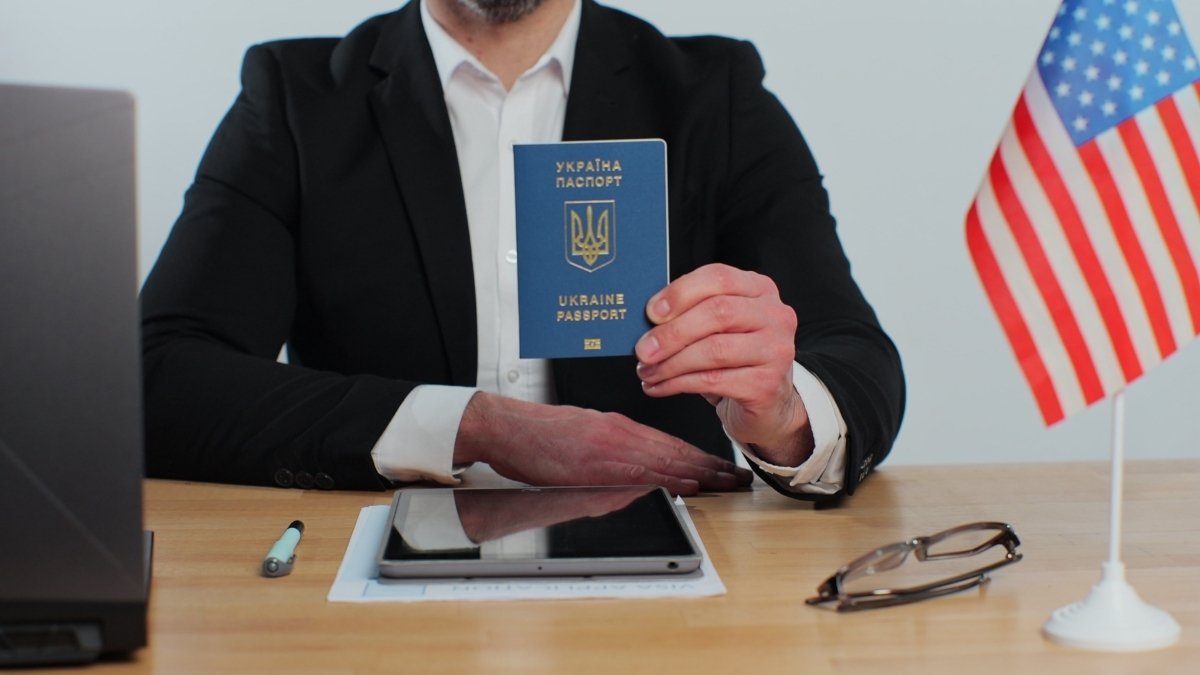
The month you travel impacts prices more than most people realize.
I tracked a full year of data and found November rates up to 20% cheaper than June. We’re talking $167 versus $201 average—that’s $34 per night.
The Cheapest Months to Travel
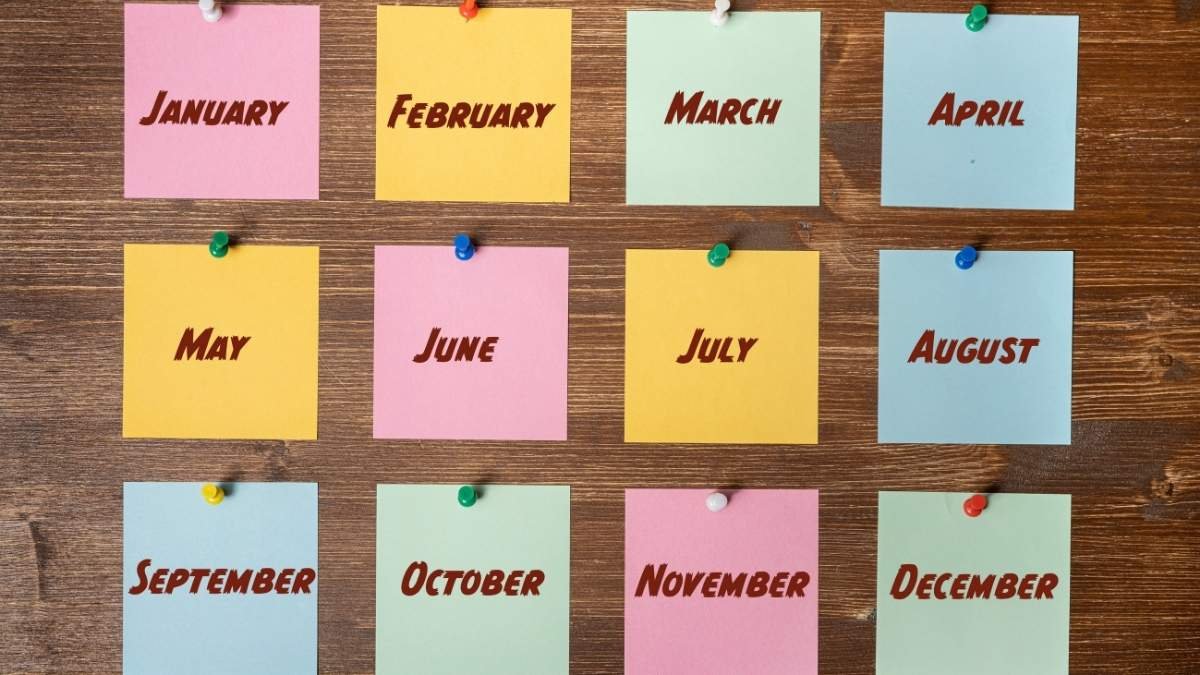
After analyzing seasonal patterns across multiple years:
Domestic travel:
- November (cheapest)
- January
- February
- September
International travel:
- November is 31% cheaper than June
- January-February post-holiday
- September-October shoulder season
Most expensive:
- June-August (summer premium)
- December holidays
- March/April spring break
The Shoulder Season Advantage
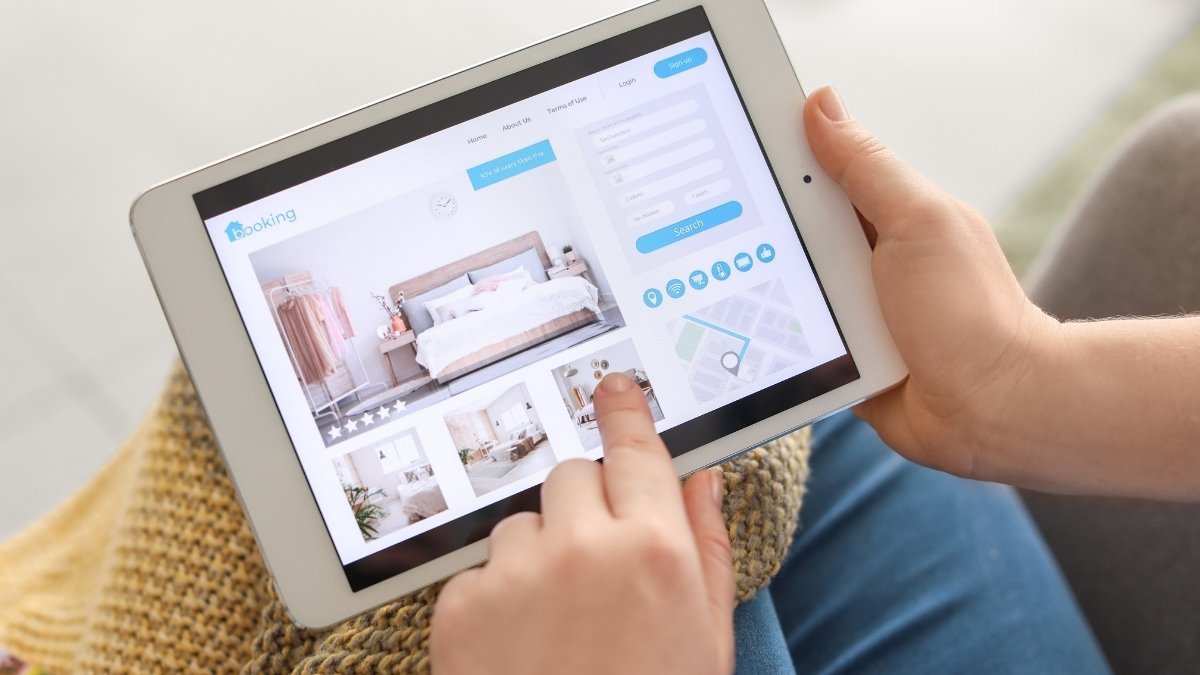
The sweet spot between peak and off-peak seasons offers the best value.
For Europe: October-November and March-April. For the Caribbean: January post-holidays, For Southern Africa: January-March and September-November
I saved 30% on a Caribbean trip by going in late January instead of the February spring break. Same weather, way better prices.
But here’s the catch: seasonal patterns interact with booking windows in complex ways. A November booking for June travel might still cost less than an April booking for the same June dates.
It’s not just about when you go—it’s about when you book for when you go.
How Hotels Actually Set Prices (The Behind-the-Scenes Algorithm)
AI Revenue Management: The 200+ Data Points
What algorithms analyze to set your room price
⚡ Real-Time Factors
- Current booking pace
- Competitor rates (checked hourly)
- OTA search volume
- Flight booking data
- Weather forecasts
- Cancellation trends
📊 Historical Patterns
- Past 3-5 years booking data
- Seasonal demand curves
- Event impact history
- Day-of-week patterns
- Guest segment behavior
- Cancellation windows
🎯 Market Intelligence
- Competitor inventory levels
- New hotel openings
- Local event calendars
- Conference schedules
- Concert/sports tickets
- Corporate travel budgets
👥 Guest Patterns
- Advance booking trends
- Length of stay patterns
- Price sensitivity by segment
- Loyalty member behavior
- Channel preference shifts
- Upgrade conversion rates
⏱️ Price Update Frequency
5-10x
Price changes
per day
365
Days of pricing
recommendations
60min
Update cycle
for top systems
💡 What This Means For You:
The same room can change price 5-10% multiple times in a single day without any change in quality. Hotels using AI pricing see 5-15% revenue increases just from smarter pricing. By 2026, 80% of mid-scale and luxury hotels will use AI revenue management.
🔍 Myth Busted: Incognito mode doesn’t affect hotel prices. Dynamic pricing is based on market-wide demand, not your browsing history or cookies.
Want to know what really grinds my gears? Hotels are adjusting prices multiple times per day, and most people have no idea.
Modern revenue management systems analyze hundreds of variables simultaneously:
- Historical booking patterns
- Current booking pace (are reservations coming in fast or slow?)
- Competitor rates (checked in real-time)
- Local events and weather
- Flight data (if lots of flights are booked, hotel demand will spike)
- OTA search volume
- Cancellation trends
These systems provide 365 days of pricing recommendations updated hourly.
One Mumbai hotel using real-time AI adjustments increased its room rates by 22% during a conference just by responding to booking velocity faster than competitors.
The Booking Pace Trigger
It’s actually pretty simple:
If bookings exceed forecast → Prices go up. If bookings lag behind the forecast → Prices go down
The same room might change price by 5-10% multiple times in a single day. This isn’t about quality—it’s pure demand forecasting.
The Incognito Mode Myth (Spoiler: It’s BS)
People always ask me: “Should I search in incognito mode to avoid price increases?”
No. That’s a myth.
I tested this extensively. Hotels and booking sites don’t raise prices based on your cookies or search history. Dynamic pricing is based on market-wide demand, not your individual browsing.
The Points Guy tested this too and found zero evidence of individual targeting. That persistent rumor? Completely debunked.
Where You Book Matters (Hotels vs. Expedia vs. Secret Sites)

Here’s an uncomfortable truth from someone who worked the front desk at a hotel:
If you book through Expedia or Booking.com, you’re not guaranteed anything and will be last in line for everything.
Overbookings? You get bumped first. Room upgrades? Not happening. Late checkout? Probably not. That nice view you were hoping for? Nope.
Why Hotels Treat Third-Party Bookings Like Second-Class Citizens
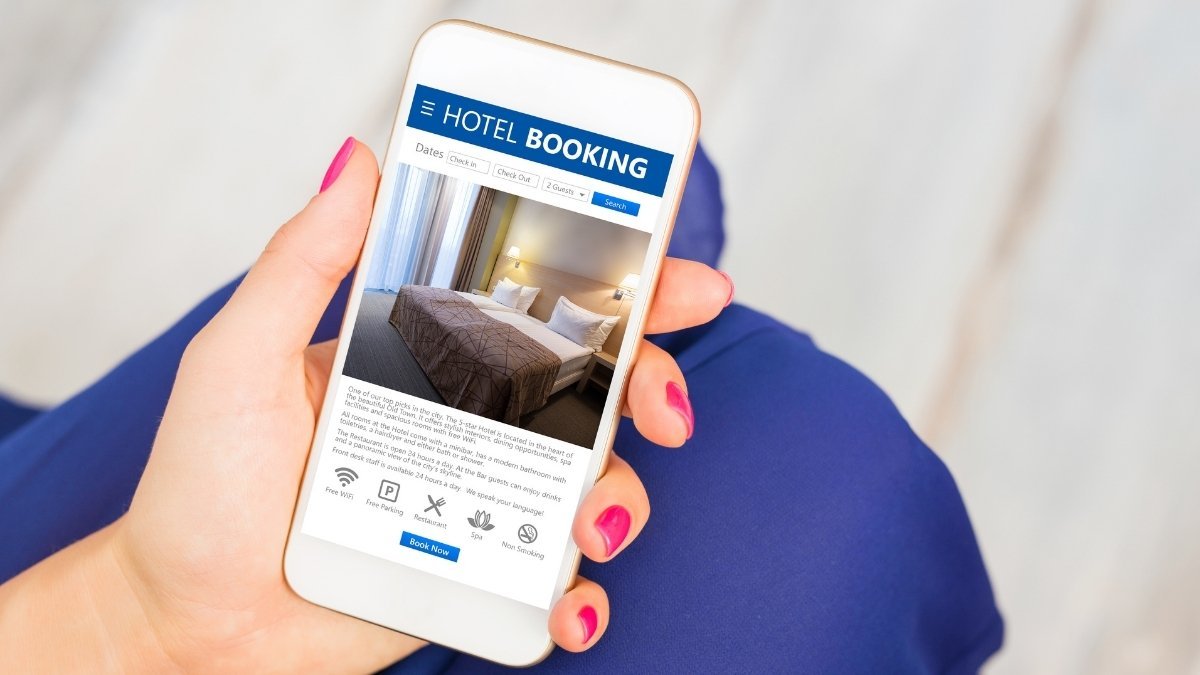
Hotels pay 15-22% commission to OTAs. That’s a huge chunk of revenue.
When choosing between upgrading a direct booker versus an Expedia customer, they favor the direct relationship every time. It’s just business.
But here’s the thing: OTAs sometimes offer better prices despite that commission cost.
So you’re facing a trade-off:
- OTA booking: 5-15% lower base price, worst service
- Direct booking: Potentially higher price, best service, and perks
The Loyalty Program Math That Changed My Mind
I used to ignore loyalty programs. Then I did the math.
If you spend $10,000 annually on hotels using a co-branded credit card earning 17X points, you generate 170,000 points, worth approximately $1,700 in free stays.
A regular 1% cash back card? You’d get $100.
That’s a 17X better return. The annual free night alone often covers the card fee.
Hotels also track lifetime value. The more you book direct as a loyalty member, the better they treat you. I’ve gotten free upgrades, late checkouts, complimentary breakfast, and even occasional suite upgrades just by being a loyal direct booker.
Secret Rate Strategies Nobody Talks About
Want to know a trick that feels like cheating?
Closed User Group (CUG) sites offer 10-50% off published rates just for being a member. And membership is free.
Sites like BusinessHotels.com give you access to “unpublished rates” simply by registering a free account. Look for the “Preferred” banner on listings.
I saved $47 per night on a Chicago business trip using a CUG rate versus the published price.
Other strategies:
- Opaque booking sites (Hotwill, Priceline Express): 25-40% off but you don’t know the exact hotel until after purchase
- Direct phone calls within 48 hours of check-in: Ask for “last room available” rates (10-50% discounts)
- Package deals: Sometimes bundling flights + hotel saves money even if you don’t need the flight
Event Pricing: When Normal Rules Don’t Apply
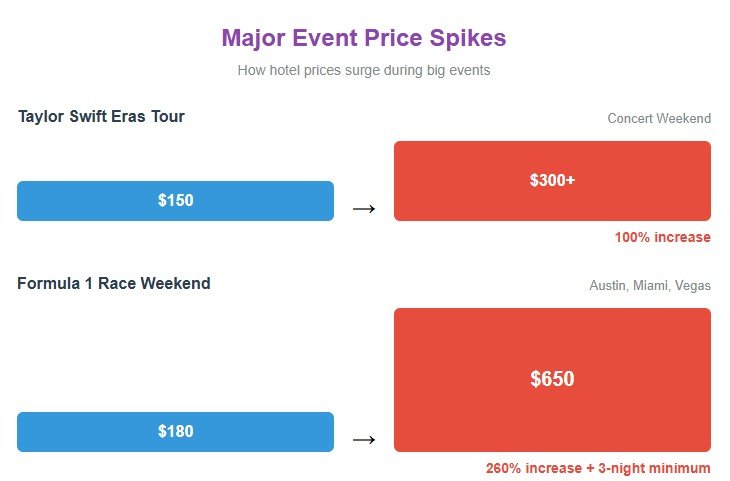
Major events blow up pricing in ways that override everything I just told you.
The Taylor Swift Eras Tour? $2.2 billion in ticket sales, $5-10 billion total economic impact. Hotel prices in tour cities spiked 50-100%+ during concert weekends.
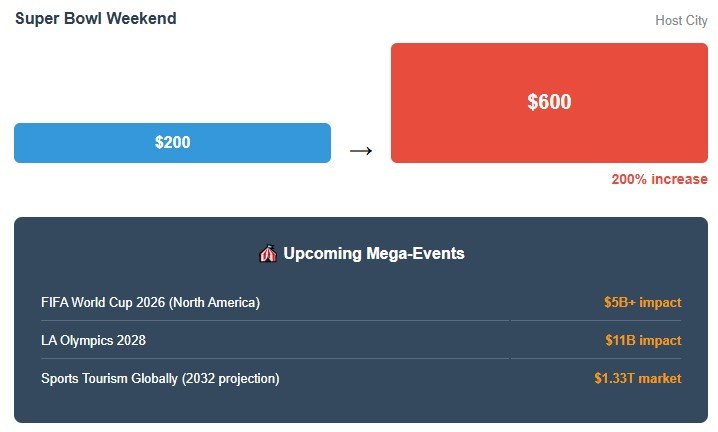
I watched Austin hotels during an F1 race. Prices went from $180/night to $650/night for the same room. Three-night minimums. Non-refundable.
Then, two weeks before the race, they started panic-selling at $300/night because they overestimated demand.
My Event Booking Strategy
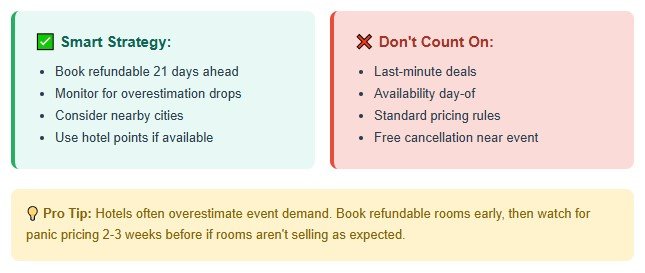
For major events:
- Book refundable rooms early (~3 months out) to secure inventory
- Watch for panic pricing 2-3 weeks before if hotels overestimated
- Never assume last-minute deals for truly sold-out events
- Consider staying 20-30 minutes outside the event zone for 50%+ savings
For truly massive events like the FIFA World Cup 2026 or the LA Olympics 2028, you need to book 6-12 months ahead or prepare for sticker shock.
The Industry Changes Happening Right Now (2024-2025)
The New Hotel Landscape
Key statistics reshaping hotel booking strategies
60%
Mobile bookings
Up from 40% in 2020
35%
Last-minute bookings
Within 7 days of check-in
46%
Bleisure travelers
Business + Leisure combo
80%
Hotels using AI pricing
By 2026 projection
📱 The Mobile Revolution
2015
2020
2024
2027*
*Projected
💼 Business Travel Recovery
$1.43T
2019 spending
(pre-pandemic)
$1.48T
2024 spending
(fully recovered!)
📈 Bleisure Boom:
Market grew from $114B (2022) to projected $731B by 2032. 275% YOY increase in bookings.
🤖 AI Impact:
Hotels using AI see 25% increase in direct bookings and 5-15% revenue gains.
⚠️ What This Means: Prices will become more volatile and change more frequently. The era of stable pricing is over. Active monitoring is now essential.
The hotel world has fundamentally shifted since the pandemic, and you need to know about it.
Mobile booking dominates: 60% of reservations now happen on phones. Last-minute surge: 35% of bookings happen within 7 days of check-in. Business travel is back: $1.48 trillion in spending, exceeding 2019 levels. Bleisure boom: 46% of business travelers now extend trips for leisure
But here’s the big one: AI-powered pricing is everywhere now.
60% of hotels use AI for pricing, and those using it see 25% increases in direct bookings by optimizing rates. By 2026, over 80% of mid-scale and luxury hotels will use AI revenue management.
What does this mean for you? Prices will get more volatile and change more frequently. The days of stable pricing are over.
New Cancellation Rules You Need to Know
California’s SB 644 (effective July 1, 2024) requires 24-hour penalty-free cancellation after booking for reservations made 72+ hours before check-in.
This is huge. If you’re booking California hotels, you now have more flexibility to cancel and rebook if prices drop.
Meanwhile, some properties are tightening up. Disney extended cancellation requirements to 8 days for 2025.
The landscape is shifting. Know the rules for your specific booking.
Your Action Plan: What to Do Right Now
Alright, let’s make this practical. Here’s exactly what I want you to do:
Step 1: Download These Tools (All Free)
- Google Hotels: Price alerts for entire cities
- Hopper: Claims 95% prediction accuracy, $61 average savings
- Kayak: Compare across multiple platforms
- Pruvo: Automatically tracks and rebooks when prices drop (up to 40% savings)
Step 2: Sign Up for Loyalty Programs
Pick one or two that match where you typically stay:
- Marriott Bonvoy
- IHG One Rewards
- World of Hyatt
- Hilton Honors
They’re free. No commitment. Instant benefits.
Step 3: Your Booking Strategy by Trip Type
Business city trip:
- Wait until 1-2 weeks before check-in
- Or gamble on 48-hour deals if flexible
- Check in Sunday-Thursday
Vacation destination:
- Monitor starting 4 months out
- Book 2-3 months before
- For all-inclusives, book 3+ months ahead
- Check in Sunday or Monday
Major events:
- Book 21 days ahead with refundable rates
- Watch for panic pricing if hotels overestimated demand
Luxury hotels:
- Wait for that sweet 15-day window
- Expect 22% discounts from early pricing
- Join loyalty program first
Budget hotels:
- Timing doesn’t matter much
- Just book whenever convenient
- Focus on getting the best location
Step 4: The Weekly Routine
Once you’ve booked:
- Set a calendar reminder for weekly price checks
- Check your booking against current rates (takes 2 minutes)
- If price dropped $30+, cancel and rebook
- Repeat until 24-72 hours before check-in (based on cancellation policy)
Step 5: Before You Click “Book”
Always verify:
- ✅ Total price including ALL fees (resort fees can add $50+/night)
- ✅ Cancellation policy and deadline
- ✅ What’s included (WiFi, breakfast, parking)
- ✅ Comparison of direct booking vs. OTA price
- ✅ Loyalty program benefits if booking direct
The Mistakes That Cost Me $500 Before I Figured This Out
Let me save you from my early mistakes:
Don’t book 2-4 months ahead thinking you’re being responsible. This is often the worst window—5-6% above average pricing. You’re in the expensive “planner penalty” zone.
Don’t use debit cards. They tie up $100+ in incidental deposits for weeks, plus you miss out on rewards points and fraud protection. I learned this when a hotel held $250 for “incidentals” on a 2-night stay.
Don’t ignore resort fees. I booked a Vegas hotel for “$89/night” that turned into $154/night with resort fees. Always click through to see the final price.
Don’t book non-refundable unless the savings are massive. I saved $15/night going non-refundable, then had to cancel due to a work conflict. Lost $450. The 10-15% savings rarely justify the risk.
Don’t assume you’re done after booking. That’s when the real game begins. 57% of bookings see price drops. Set those alerts!
The Bottom Line: Everything You Thought Was Wrong
After tracking 50+ bookings and analyzing thousands of data points, here’s what I know for sure:
Early booking costs you money 66-73% of the time.
The 15-day window is the sweet spot for most trips, saving 13% on average.
Luxury hotels discount the most at 22% versus budget hotels at 5%.
Where you’re going matters more than when you’re traveling.
57% of bookings see price drops after you book—that’s $62 average savings just sitting there.
Check-in day matters enormously—Sunday saves $39/night versus Friday.
Hotels treat direct bookers better, but OTAs sometimes offer lower prices.
Event pricing follows different rules—book early or risk getting priced out.
The era of “book it and forget it” is dead. Hotels use sophisticated AI that changes prices multiple times per day. The only way to win is to play the same game.
Set your alerts. Track those prices. Cancel and rebook when it makes sense.
Stay flexible on dates when you can. Book refundable when possible. Join loyalty programs. Compare platforms religiously.
It’s a bit more work than just clicking “book now” four months ahead and hoping for the best. But when you’re saving $30-100+ per night? That work pays for itself in about 3 minutes.
Now It’s Your Turn
I want to hear from you. Have you noticed hotel prices dropping after you booked? Did you cancel and rebook? What’s your biggest hotel booking frustration?
Drop a comment below and let me know what worked (or didn’t work) for your last trip.
And if you found this helpful, bookmark it for your next booking. Better yet, share it with that friend who always complains about overpaying for hotels.
The game has changed. Now you know how to play it.
Happy booking—and happy savings! 💰






